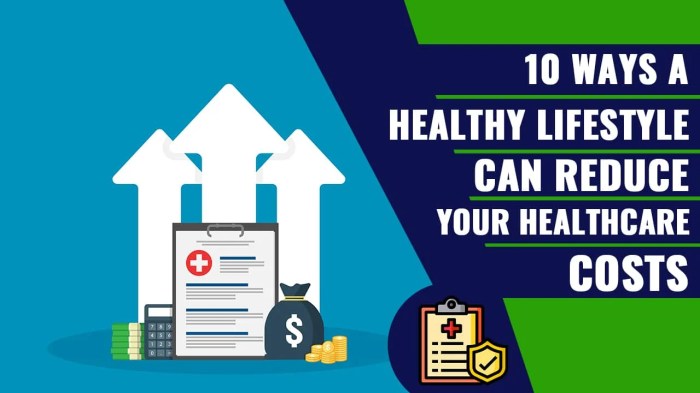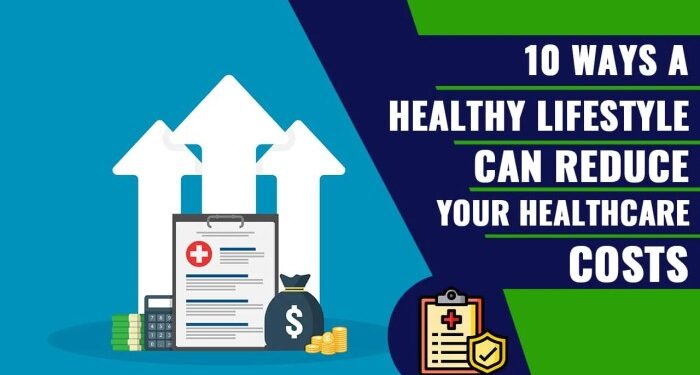Healthy Living Habits That Reduce Insurance Costs sets the stage for this enthralling narrative, offering readers a glimpse into a story that is rich in detail and brimming with originality from the outset.
Delve into the specifics of how healthy lifestyle choices can directly impact insurance premiums, leading to potential cost savings for individuals.
Importance of Healthy Living Habits
Healthy living habits play a crucial role in reducing insurance costs as they contribute to overall well-being and lower the risk of developing chronic health conditions. Insurance companies often offer discounts and incentives to policyholders who demonstrate healthy lifestyle choices.
Impact on Insurance Premiums
- Regular exercise and maintaining a healthy weight can decrease the risk of heart disease, diabetes, and other health issues, leading to lower insurance premiums.
- A balanced diet rich in fruits, vegetables, and whole grains can improve overall health and reduce the likelihood of costly medical interventions.
- Avoiding smoking and excessive alcohol consumption can significantly lower the risk of developing certain cancers and respiratory conditions, resulting in lower insurance costs.
Incentives for Healthy Lifestyle Choices
- Insurance companies may offer premium discounts or cash rewards for policyholders who participate in wellness programs, engage in regular health screenings, or achieve specific health targets.
- Some insurers provide benefits such as gym memberships, nutrition counseling, or discounted rates on fitness devices to encourage healthy behaviors among their policyholders.
- Policyholders who actively engage in preventive care and demonstrate commitment to maintaining a healthy lifestyle may be eligible for additional perks and savings on their insurance premiums.
Specific Healthy Habits for Reducing Insurance Costs

Maintaining specific healthy habits can directly impact insurance costs by reducing the risk of health issues and claims, leading to lower premiums. Activities such as regular exercise, a balanced diet, non-smoking, and limited alcohol consumption play a significant role in influencing insurance pricing.
Regular Exercise
Regular physical activity not only improves overall health but also lowers the risk of chronic diseases such as heart disease, diabetes, and obesity. Insurers often offer discounts to individuals who engage in regular exercise as they are deemed to be at lower risk of health-related claims.
Balanced Diet
Eating a balanced diet rich in fruits, vegetables, whole grains, and lean proteins can help maintain a healthy weight and reduce the likelihood of developing health conditions like high blood pressure and cholesterol. Insurance companies may reward individuals with lower premiums for following a nutritious diet.
Non-Smoking
Smoking is a major risk factor for various health issues, including cancer, respiratory diseases, and heart conditions. Non-smokers are generally charged lower insurance premiums as they are less likely to require medical interventions due to smoking-related illnesses.
Limited Alcohol Consumption
Excessive alcohol consumption can contribute to liver disease, heart problems, and mental health issues. Individuals who limit their alcohol intake are considered lower risk by insurance providers, which can result in reduced insurance costs.
Preventive Measures and Insurance Savings
Regular preventive healthcare plays a crucial role in reducing insurance expenses by catching potential health issues early on and preventing costly treatments down the line. Insurance companies often incentivize policyholders to adopt healthy habits and undergo routine check-ups through cost-saving measures.
Routine Check-ups and Screenings
One of the most effective ways to lower insurance costs is by scheduling regular check-ups and screenings. By detecting health issues in their early stages, individuals can avoid more expensive treatments and hospitalizations. Insurance companies usually offer discounts or lower premiums to policyholders who commit to regular preventive care.
- Annual physical exams: Regular check-ups with a primary care physician can help monitor overall health and detect any potential concerns early on.
- Screenings for chronic conditions: Tests such as blood pressure checks, cholesterol screenings, and diabetes screenings can help manage and prevent chronic diseases.
- Cancer screenings: Mammograms, colonoscopies, and other cancer screenings are essential in catching cancer at its earliest and most treatable stages.
Healthy Lifestyle Choices
In addition to regular screenings, insurance companies also reward policyholders who make healthy lifestyle choices. By adopting habits that promote overall well-being, individuals can reduce their risk of developing costly health conditions.
- Exercise and physical activity: Staying active can lower the risk of heart disease, obesity, and other chronic conditions.
- Healthy diet: Eating a balanced diet rich in fruits, vegetables, and whole grains can help maintain a healthy weight and prevent illnesses.
- Smoking cessation: Quitting smoking not only improves overall health but also reduces the risk of various diseases.
Wellness Programs and Insurance Benefits
Participating in wellness programs can have a significant impact on insurance costs for individuals. Insurers often offer incentives and benefits to policyholders who engage in these programs as a way to promote healthy living habits and reduce the risk of costly medical claims.
Types of Wellness Initiatives Supported by Insurers
- Health screenings and assessments to identify potential health risks early on.
- Weight management programs to help individuals maintain a healthy body weight.
- Fitness challenges and incentives to encourage regular physical activity.
- Nutritional counseling and education to promote healthy eating habits.
Success Stories of Wellness Program Participants
John, a policyholder, joined a wellness program offered by his insurance company and actively participated in fitness challenges and nutritional counseling sessions. As a result, he was able to improve his overall health, reduce his risk factors for chronic diseases, and subsequently lower his insurance premiums due to fewer medical claims.
Sarah, another policyholder, took advantage of health screenings and assessments provided by her insurer. By addressing health issues early on and making necessary lifestyle changes, she was able to save on insurance costs in the long run by avoiding expensive medical treatments.
Last Recap
In conclusion, adopting healthy living habits not only benefits your well-being but can also have a positive effect on your insurance costs. By making simple changes to your lifestyle, you could potentially reduce your insurance expenses and enjoy a healthier life simultaneously.
Popular Questions
How do healthy living habits affect insurance costs?
Healthy living habits such as regular exercise and a balanced diet can lead to lower insurance costs by reducing the risk of health issues.
Do insurance companies offer incentives for healthy lifestyle choices?
Yes, insurance companies often provide discounts or rewards for policyholders who demonstrate healthy habits through wellness programs or preventive measures.
What are some specific healthy habits that can reduce insurance costs?
Activities like non-smoking, limited alcohol consumption, and regular health check-ups are directly linked to lower insurance premiums.




